Observing small animals from space will soon be reality
 The ambitious and globally unique ICARUS project receives funding from ROSKOSMOS.
The ambitious and globally unique ICARUS project receives funding from ROSKOSMOS.
Dec 3rd, 2014
Read more
 Subscribe to our Space Exploration News feed
Subscribe to our Space Exploration News feed
 The ambitious and globally unique ICARUS project receives funding from ROSKOSMOS.
The ambitious and globally unique ICARUS project receives funding from ROSKOSMOS.
Dec 3rd, 2014
Read morePhysicists have developed a novel camera technology which for the first time allows sources of cosmic gamma radiation to be observed without interruption even when the moon is shining brightly.
Dec 3rd, 2014
Read more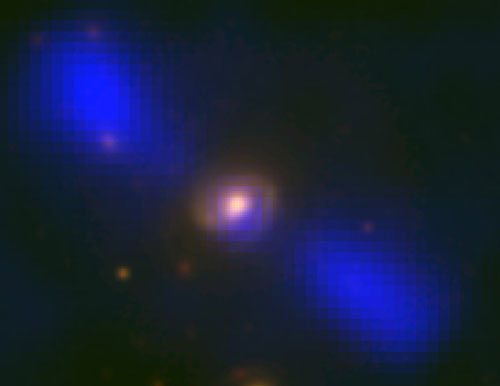 With the help of citizen scientists, astronomers have found an important new example of a very rare type of galaxy that may provide valuable insight on galaxy evolution in the early Universe.
With the help of citizen scientists, astronomers have found an important new example of a very rare type of galaxy that may provide valuable insight on galaxy evolution in the early Universe.
Dec 2nd, 2014
Read moreDid Mars ever have life? Does it still? A meteorite from Mars has reignited the old debate. An international team has published a paper, showing that martian life is more probable than previously thought.
Dec 2nd, 2014
Read moreRecently, the infrared Herschel Space Observatory, has taken a series of beautiful high-resolution infrared images of Andromeda. It is the first time we can see M31, at these wavelengths, at such a high resolution.
Dec 1st, 2014
Read more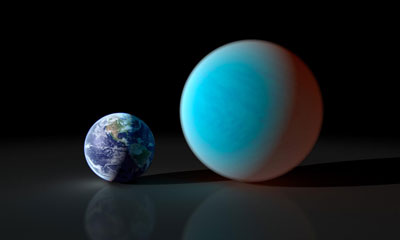 Astronomers have measured the passing of a super-Earth in front of a bright, nearby Sun-like star using a ground-based telescope for the first time. The transit of the exoplanet 55 Cancri e is the shallowest detected from the ground yet. Since detecting a transit is the first step in analyzing a planet's atmosphere, this success bodes well for characterizing the many small planets that upcoming space missions are expected to discover in the next few years.
Astronomers have measured the passing of a super-Earth in front of a bright, nearby Sun-like star using a ground-based telescope for the first time. The transit of the exoplanet 55 Cancri e is the shallowest detected from the ground yet. Since detecting a transit is the first step in analyzing a planet's atmosphere, this success bodes well for characterizing the many small planets that upcoming space missions are expected to discover in the next few years.
Dec 1st, 2014
Read more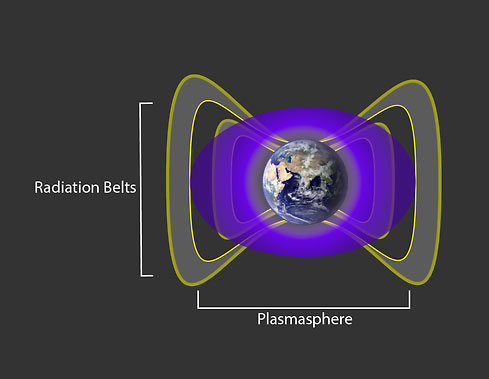 Two donuts of seething radiation that surround Earth, called the Van Allen radiation belts, have been found to contain a nearly impenetrable barrier that prevents the fastest, most energetic electrons from reaching Earth.
Two donuts of seething radiation that surround Earth, called the Van Allen radiation belts, have been found to contain a nearly impenetrable barrier that prevents the fastest, most energetic electrons from reaching Earth.
Nov 26th, 2014
Read more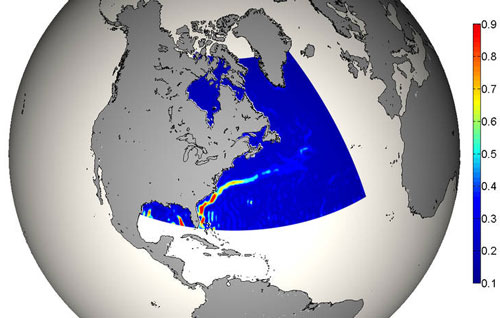 Just four months after the final data package from the GOCE satellite mission was delivered, researchers are laying out a rich harvest of scientific results, with the promise of more to come.
Just four months after the final data package from the GOCE satellite mission was delivered, researchers are laying out a rich harvest of scientific results, with the promise of more to come.
Nov 26th, 2014
Read more The criteria for life on other planets is the focus of the 4th Australian Exoplanet Workshop, hosted by the University of Southern Queensland this week. The first in this series on exoplanets looks at the story so far in the search for life elsewhere in the universe.
The criteria for life on other planets is the focus of the 4th Australian Exoplanet Workshop, hosted by the University of Southern Queensland this week. The first in this series on exoplanets looks at the story so far in the search for life elsewhere in the universe.
Nov 25th, 2014
Read more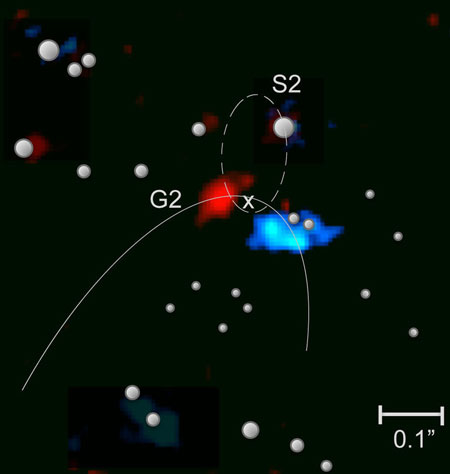 Researchers discover that two clouds belong to the same complex.
Researchers discover that two clouds belong to the same complex.
Nov 25th, 2014
Read more Competitors have a shot at a share of $5 million in prize money and an opportunity to participate in space exploration and technology development, to include a chance at flying their very own CubeSat to the moon and beyond as secondary payload on the first integrated flight of NASA's Orion spacecraft and Space Launch System rocket.
Competitors have a shot at a share of $5 million in prize money and an opportunity to participate in space exploration and technology development, to include a chance at flying their very own CubeSat to the moon and beyond as secondary payload on the first integrated flight of NASA's Orion spacecraft and Space Launch System rocket.
Nov 25th, 2014
Read more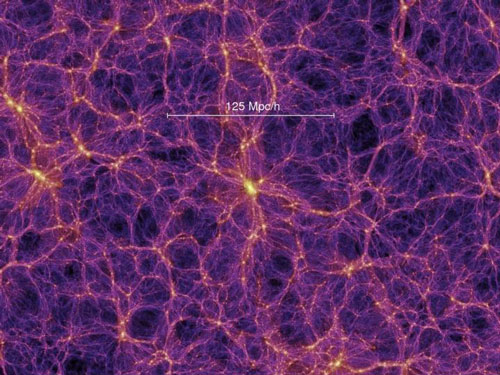 How do galaxies like our Milky Way form, and just how do they evolve? Are galaxies affected by their surrounding environment? An international team of researchers proposes some answers. The researchers highlight the role of the 'cosmic web' on the evolution of galaxies that took place in the distant universe, a few billion years after the Big Bang.
How do galaxies like our Milky Way form, and just how do they evolve? Are galaxies affected by their surrounding environment? An international team of researchers proposes some answers. The researchers highlight the role of the 'cosmic web' on the evolution of galaxies that took place in the distant universe, a few billion years after the Big Bang.
Nov 21st, 2014
Read moreA short but significant 'thud' was heard by the Cometary Acoustic Surface Sounding Experiment (CASSE) as Philae made its first touchdown on Comet 67P/Churyumov-Gerasimenko. The two-second recording from space is the very first of the contact between a man-made object with a comet upon landing.
Nov 21st, 2014
Read moreScientists developed a new method which allows to estimate the magnetic field of a distant exoplanet, i.e., a planet, which is located outside the Solar system and orbits a different star.
Nov 20th, 2014
Read more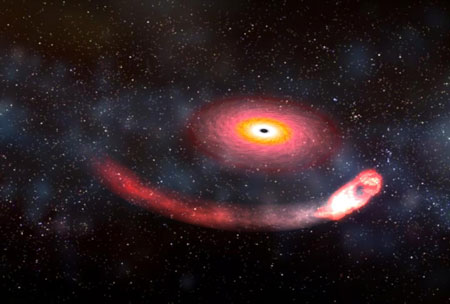 A team of scientists hope to trace the origins of gamma-ray bursts with the aid of giant space 'microphones.' Researchers are trying to work out the possible sounds scientists might expect to hear when the ultra-sensitive LIGO and Virgo detectors are switched on in 2015.
A team of scientists hope to trace the origins of gamma-ray bursts with the aid of giant space 'microphones.' Researchers are trying to work out the possible sounds scientists might expect to hear when the ultra-sensitive LIGO and Virgo detectors are switched on in 2015.
Nov 20th, 2014
Read more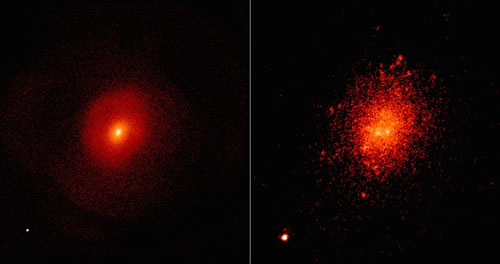 Astronomers have discovered an object in space that might be a black hole catapulted out of a galaxy. Or, according to an alternative interpretation, it might be a giant star that is exploding over an exceptionally long period of several decades. In any case, one thing is certain: This mysterious object is something quite unique, a source of fascination for physicists the world over because of its potential to provide experimental confirmation of the much-discussed gravitational waves predicted by Albert Einstein.
Astronomers have discovered an object in space that might be a black hole catapulted out of a galaxy. Or, according to an alternative interpretation, it might be a giant star that is exploding over an exceptionally long period of several decades. In any case, one thing is certain: This mysterious object is something quite unique, a source of fascination for physicists the world over because of its potential to provide experimental confirmation of the much-discussed gravitational waves predicted by Albert Einstein.
Nov 19th, 2014
Read more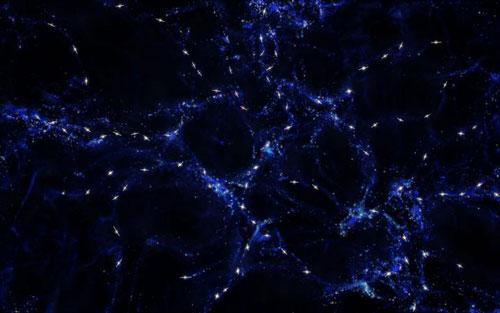 Observations with ESO's Very Large Telescope have revealed alignments over the largest structures ever discovered in the universe. A research team has found that the rotation axes of the central supermassive black holes in a sample of quasars are parallel to each other over distances of billions of light-years. Also found was that the rotation axes of these quasars tend to be aligned with the structures in the cosmic web in which they reside.
Observations with ESO's Very Large Telescope have revealed alignments over the largest structures ever discovered in the universe. A research team has found that the rotation axes of the central supermassive black holes in a sample of quasars are parallel to each other over distances of billions of light-years. Also found was that the rotation axes of these quasars tend to be aligned with the structures in the cosmic web in which they reside.
Nov 19th, 2014
Read moreFor years physicists have been looking for the universe's elusive dark matter, but so far no one has seen any trace of it. Maybe we are looking in the wrong place? Now physicists from University of Southern Denmark propose a new technique to detect dark matter.
Nov 18th, 2014
Read more